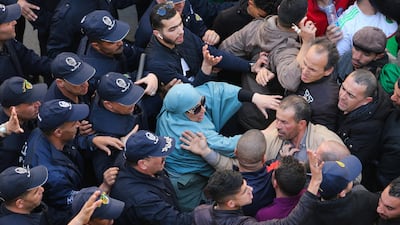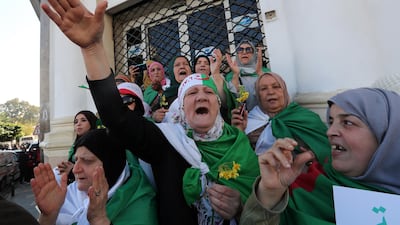Polls have opened in Algeria for a vote on a revised constitution, a move the government hopes will placate the protest movement that last year forced a president from power.
Here's what you need to know.
Why does Algeria need a new constitution?
On February 16 2019, thousands of Algerians took to the streets protesting against high unemployment and government corruption.
The protesters, known collectively as the “Hirak,”or “movement” have demanded root and branch political change, including a new constitution.
At the time, the former President Abdelaziz Bouteflika had confirmed he would run for a fifth presidential term, having been in power for 20 years. The 83 year old former president suffered a stroke in 2013 and was widely regarded as unfit to remain in power.
For a clique of Algerian generals and business leaders, a fifth term for Bouteflika may have been the ideal outcome.
Algeria’s government has long been characterised as an opaque, narrow clique of military-linked figures and industrialists known as “le pouvoir” or “the power.”
Leading politicians have mostly been symbolic figureheads, in power only with the blessing of the military. Opposition political parties are legal, but tightly controlled and this situation has worsened since 2019.
In April 2019, Hirak forced the resignation of Abdelaziz Bouteflika, but this did not stop the movement who demanded the government’s resignation.
Protests continued without relent until Covid-19 stunted the movement earlier this year.
The government has responded to Hirak with a mixture of crackdowns and concessions: a large number of prominent business leaders linked to Bouteflika have been arrested in high profile trials, charged with corruption.
In December, elections touted by the government as free and fair were held. President Abdelmadjid Tebboune was voted into office, albeit after a record low turnout.
Mr Tebboune, who promised that the referendum would go ahead November 1, is currently in hospital in Germany being treated for Covid-19.
Could the new constitution appease protesters?
This is unlikely, in part because there have been several constitutional amendments in the past few decades.
In 1988 for example, after bloody riots swept the country the government also promised a constitutional referendum.
Former Interior Minister Aboubakr Belkaid said at the time that a new constitution would “assure individual liberties and establish the sovereignty of the law.''
Likewise, Article 38, Chapter 9 of the existing constitution already guarantees the kind of rights the Hirak has sought, stating that “the rights of the citizen shall be guaranteed.”
But it does feature some meaningful changes.
The proposed changes limit not only presidential terms, but also the terms of MPs. The President will no longer be able to appoint the Prime Minister and will instead have to nominate a candidate from the largest parliamentary bloc.
Press freedoms are also supposedly guaranteed, but again this is little different from the current constitution.
As with any constitution, much will depend on political will to uphold the contents of the document.
That the current draft allows the PM to appoint top military positions could be important, but may not change the fundamental problem, which is that the army remains a dominant state institution and any future PM could be pressured to make appointments.
Likewise, the President will be tasked with “protecting the constitution,” vague wording suggesting a concentration of power.
Perhaps then, the new document is not quite the “new Algeria” touted by the current government.

















